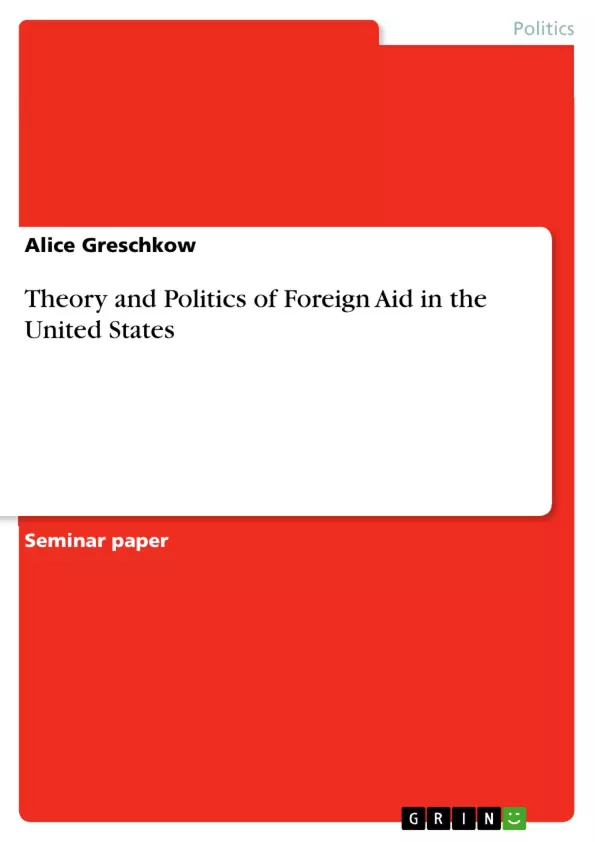This term paper deals with the question if development assistance can be seen as an effective response to global terrorism after the September 11 attacks. However, the main focus will be set on the foreign aid of the USA, since the direct political reactions after the terrorist attacks had a bigger impact than the ones of the European Union or other states, in spite of the terrorist attacks in London and Madrid. Furthermore, it is important to focus on a rather narrow and clear aspect in order to achieve a deepened discourse instead of a superficial catch-all debate, which could not be provided properly with the formal limitations of this paper anyway.
In order to answer the question, in the following chapter will be briefly described how US aid was provided before 9/11, including the most important countries and methods applied to achieve the goals. Afterwards the shift of perspective in foreign policy and the related aid allocation will be presented, while the increased effort and the outcomes will be portrayed. Finally, concluding remarks will summarize the findings and arguments of this essay.
The Al-Qaeda terrorist attacks against the United States of America on September 11th 2001 changed worldwide political dynamics and the perception of political challenges and issues in regions, in which mainly Muslims live. The symbolic attack of the extremists against the Western world opened the debate why such hatred developed and more important how the repetition of such events could be avoided in the future. While the Bush administration quickly and publicly decided to intervene militarily in Iraq and Afghanistan in order to find the responsible ones behind the attacks, it has been concluded as well to work on the security of US citizens through development assistance.
Reconciliation, the promotion of democracy and the increase of the education level in regions, in which Muslim extremist were trained and radicalized have been perceived as key aspects of the war on terror, going beyond the military classic concept of war. Nevertheless, military forces have spent more than a decade in Afghanistan and left Iraq earlier with a poor administrative state. A possible connection between violence, attacks and humiliation and the present forces supposedly has been observed by the Muslim community after cases of torture by soldiers became public, which appears to be a contradiction to the noble goal of the promotion of peace, freedom and security.
Inhaltsverzeichnis (Table of Contents)
- 1. Introduction
- 2.1. US aid before 9/11 – an economic discourse biased by the Cold War?
- 2.2. US aid after 9/11 – an effective tool for the war on terrorism?
- 3. Conclusion
Zielsetzung und Themenschwerpunkte (Objectives and Key Themes)
This essay analyzes the effectiveness of development assistance as a response to global terrorism after the September 11th attacks, focusing on US foreign aid. The main objective is to understand how US aid policy shifted after 9/11 and to evaluate its effectiveness in combating terrorism. Key themes explored in the text include:- The evolution of US foreign aid policy from the Cold War era to the post-9/11 context.
- The role of development assistance in promoting stability and countering extremism.
- The relationship between US foreign aid, national security, and the war on terror.
- The effectiveness of US aid in achieving its objectives in the context of global terrorism.
Zusammenfassung der Kapitel (Chapter Summaries)
- Introduction: This chapter introduces the central question of the essay: "Is development assistance an effective response to global terrorism after 9/11?". It highlights the significance of US foreign aid in the context of the war on terror and sets the stage for the subsequent analysis.
- 2.1. US aid before 9/11 – an economic discourse biased by the Cold War?: This chapter examines the historical development of US foreign aid policy before the September 11th attacks, emphasizing its connection to Cold War strategies and national security interests. It discusses the role of the Marshall Plan and the evolution of US aid priorities during the Cold War, highlighting the interplay between economic and political motivations.
Schlüsselwörter (Keywords)
The primary focus of this work is on the relationship between US foreign aid, terrorism, and national security. Key terms and concepts include development assistance, counterterrorism, the war on terror, Cold War, US foreign policy, and the effectiveness of aid programs.Frequently Asked Questions
How did US foreign aid change after the September 11 attacks?
After 9/11, US foreign aid shifted towards becoming a strategic tool in the "war on terror." It focused on promoting democracy, education, and reconciliation in Muslim-majority regions to counter extremism and prevent future attacks.
Was US aid policy before 9/11 different?
Yes, prior to 9/11, US aid was largely influenced by Cold War dynamics and economic discourses, often used as a tool for national security interests against communist influence, exemplified by the Marshall Plan.
Can development assistance effectively combat global terrorism?
The paper explores this central question, analyzing whether aid can address the root causes of hatred and radicalization. However, it also notes contradictions, such as the negative impact of military presence and reports of torture on the goal of promoting peace.
What specific goals did the Bush administration have for aid in the "war on terror"?
The administration aimed to use development assistance to work on the security of US citizens by promoting reconciliation, democracy, and increasing education levels in regions where extremists were trained.
What is the relationship between US foreign aid and national security?
US foreign aid is frequently utilized as an instrument of national security, shifting its focus based on global political challenges—from the Cold War containment to post-9/11 counterterrorism efforts.
- Quote paper
- Alice Greschkow (Author), 2013, Theory and Politics of Foreign Aid in the United States, Munich, GRIN Verlag, https://www.grin.com/document/372524



